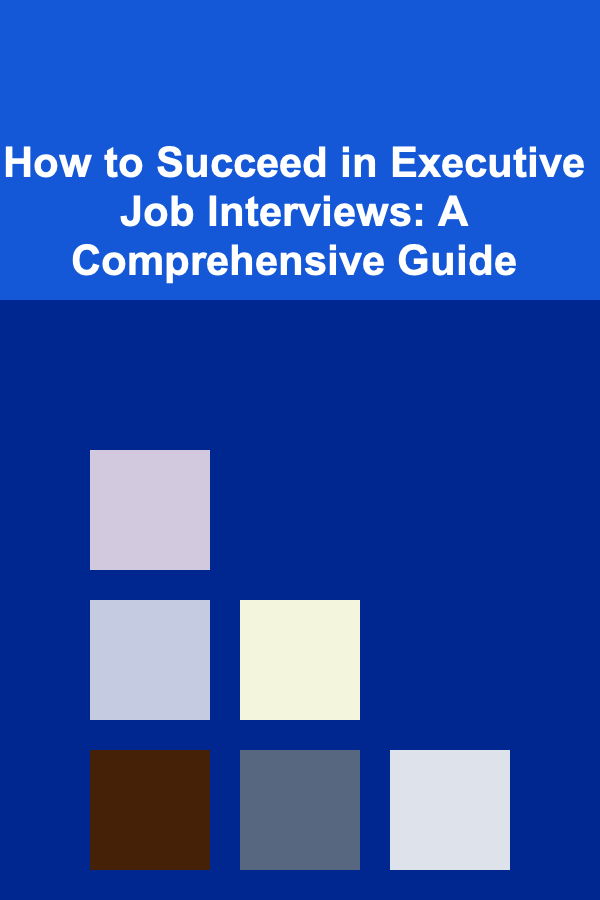
How to Succeed in Executive Job Interviews: A Comprehensive Guide
ebook include PDF & Audio bundle (Micro Guide)
$12.99$7.99
Limited Time Offer! Order within the next:

Introduction: The Stakes Are High
Executive job interviews are unlike any other. The stakes are significantly higher, the competition is fiercer, and the expectations are more demanding. You're not just selling your skills; you're showcasing your leadership potential, strategic vision, and ability to drive organizational success. These interviews often involve multiple rounds, in-depth discussions with senior leaders, and even presentations or case studies. Therefore, preparing thoroughly and strategically is paramount. This guide provides a comprehensive roadmap to help you navigate the complexities of executive job interviews and significantly increase your chances of landing your dream role.
Phase 1: Pre-Interview Preparation - Laying the Groundwork for Success
1. Understanding the Company and the Role: Deep Dive Research
Before even thinking about crafting your answers, you need a profound understanding of the company, its industry, and the specific role you're applying for. This goes far beyond a quick glance at their website. Consider the following:
- Company History and Culture: Explore the company's origins, key milestones, significant successes, and any notable challenges they've overcome. Understand their values, mission statement, and corporate culture. Read employee reviews on platforms like Glassdoor to get an insider's perspective. Look for information on their commitment to diversity, equity, and inclusion (DEI). How do they treat their employees? What is their leadership style like?
- Industry Landscape: Analyze the company's position within the industry. Who are their main competitors? What are the current trends and disruptive forces shaping the market? Understand the regulatory environment and any potential legal or ethical considerations. Read industry reports, articles, and publications to stay informed.
- Financial Performance: If the company is publicly traded, analyze their financial statements (annual reports, quarterly earnings). Look for key performance indicators (KPIs), revenue growth, profitability, and debt levels. Understand their financial health and identify any potential risks or opportunities. Even if private, try to ascertain key performance metrics through available research.
- The Specific Role: Carefully analyze the job description. What are the key responsibilities, required skills, and desired qualifications? What are the biggest challenges and opportunities associated with the role? Who will you be reporting to, and who will be reporting to you? Understand the role's place within the organizational structure. Consider connecting with individuals who currently hold or have previously held similar positions (through LinkedIn, for example) to gain valuable insights.
2. Self-Assessment and Storytelling: Crafting Your Narrative
Executive interviews are all about showcasing your leadership experience and impact. This requires a thorough self-assessment and the ability to articulate your accomplishments through compelling storytelling. Consider these steps:
- Identify Key Accomplishments: Review your career history and identify 5-7 significant accomplishments that demonstrate your leadership skills, problem-solving abilities, and strategic thinking. These should be more than just tasks you performed; they should be instances where you made a measurable impact on the organization. Quantify your achievements whenever possible (e.g., "Increased sales by 20%," "Reduced operational costs by 15%," "Successfully launched a new product that generated $1 million in revenue").
- The STAR Method: Use the STAR method (Situation, Task, Action, Result) to structure your stories. For each accomplishment, clearly describe the Situation (the context and background), the Task (your specific objective), the Action (the steps you took to achieve the objective), and the Result (the outcome and impact of your actions).
- Highlight Leadership Qualities: Identify the leadership qualities you demonstrated in each accomplishment (e.g., strategic thinking, decision-making, communication, teamwork, problem-solving, innovation, adaptability). Be prepared to articulate how these qualities contributed to your success.
- Identify Your Weaknesses (and Spin Them Positively): Every candidate has weaknesses. The key is to be honest about them while framing them in a positive light. Choose a weakness that you are actively working to improve. Focus on the steps you are taking to address the weakness and the progress you have made. For example, instead of saying "I'm bad at delegating," say "I sometimes struggle with delegating because I'm a perfectionist. However, I'm actively working on trusting my team members more and empowering them to take ownership of their tasks."
- Practice Storytelling: Rehearse your stories until you can deliver them confidently and concisely. Practice in front of a mirror, record yourself, or ask a friend or mentor to provide feedback. Pay attention to your body language, tone of voice, and pacing.
3. Anticipating Questions: Preparing for the Inevitable
While you can't predict every question, you can anticipate many of them based on the job description, the company's profile, and common executive interview themes. Here are some examples of questions you should prepare for:
- Behavioral Questions: These questions explore your past behavior to predict future performance. Examples include: "Tell me about a time you had to make a difficult decision," "Describe a situation where you had to lead a team through a challenging situation," "Give me an example of a time you failed and what you learned from it."
- Situational Questions: These questions present hypothetical scenarios to assess your problem-solving and decision-making skills. Examples include: "What would you do if you discovered a major ethical violation within the company?," "How would you handle a conflict between two key team members?," "Imagine a new competitor enters the market and threatens the company's market share. How would you respond?"
- Strategic Questions: These questions evaluate your strategic thinking and vision. Examples include: "What are your thoughts on the company's current strategy?," "How would you approach expanding the company into a new market?," "What are the biggest challenges and opportunities facing the industry in the next 5 years?"
- Leadership Questions: These questions assess your leadership style and approach. Examples include: "How would you describe your leadership style?," "How do you motivate and inspire your team?," "How do you handle performance management?," "How do you foster a culture of innovation and collaboration?"
- "Tell Me About Yourself" (The Executive Version): This isn't just about reciting your resume. Focus on your key accomplishments and how they align with the requirements of the role. Highlight your leadership experience, strategic thinking, and problem-solving abilities. Conclude with a clear statement of why you are interested in the position and what you hope to achieve in the role.
- Questions About the Company: "Why are you interested in this company?," "What do you know about our products/services?," "What are your thoughts on our company culture?" These questions demonstrate your research and genuine interest in the organization.
- Salary Expectations: Research the average salary range for the position in your location. Be prepared to discuss your salary expectations and be willing to negotiate.
- "Do You Have Any Questions For Us?": This is a crucial opportunity to demonstrate your engagement and further assess whether the role is a good fit for you. Prepare thoughtful and insightful questions about the company, the role, and the team. Examples include: "What are the company's biggest priorities for the next year?," "What are the biggest challenges facing the team?," "What opportunities are there for professional development and growth within the company?," "What is the leadership team's vision for the future of the company?" Avoid asking questions that can easily be answered by a quick Google search.
4. Practicing Your Delivery: Polish and Presence
Practice makes perfect. Rehearse your answers to common interview questions until you can deliver them confidently and naturally. Consider the following:
- Mock Interviews: Conduct mock interviews with a friend, mentor, or career coach. Ask them to provide honest feedback on your answers, body language, and overall performance.
- Video Recording: Record yourself answering interview questions. This will allow you to identify areas for improvement in your delivery, such as your tone of voice, body language, and eye contact.
- Body Language: Pay attention to your body language. Maintain eye contact, sit up straight, smile, and use gestures to emphasize your points. Avoid fidgeting or crossing your arms, as this can convey nervousness or disinterest.
- Tone of Voice: Speak clearly and confidently. Vary your tone of voice to keep the interviewer engaged. Avoid speaking too quickly or too slowly.
- Dress Code: Dress professionally and appropriately for the company culture. When in doubt, err on the side of being more formal. A well-tailored suit is almost always a safe bet.
Phase 2: During the Interview - Showcasing Your Value
1. First Impressions Matter: Projecting Confidence and Professionalism
The first few minutes of the interview are critical. Make a strong first impression by:
- Arriving on Time (or Early): Plan your route in advance and allow ample time for traffic and parking. Arriving early demonstrates respect for the interviewer's time and shows that you are organized and reliable.
- Dressing Professionally: As mentioned earlier, dress appropriately for the company culture. Ensure your clothes are clean, wrinkle-free, and well-fitting.
- Making Eye Contact and Smiling: Maintain eye contact with the interviewer and smile to convey warmth and enthusiasm.
- Offering a Firm Handshake: Offer a firm handshake to demonstrate confidence and professionalism.
- Expressing Enthusiasm: Express your enthusiasm for the role and the company. Let the interviewer know that you are genuinely excited about the opportunity.
2. Active Listening and Thoughtful Responses: Demonstrating Engagement and Understanding
The interview is a two-way conversation. Active listening is crucial for understanding the interviewer's questions and providing thoughtful responses. Consider the following:
- Pay Attention to the Question: Listen carefully to the interviewer's question before formulating your response. If you are unsure about something, ask for clarification.
- Take Your Time: Don't rush to answer the question. Take a moment to gather your thoughts and formulate a clear and concise response.
- Provide Specific Examples: Back up your claims with specific examples from your past experience. Use the STAR method to structure your stories and quantify your achievements whenever possible.
- Tailor Your Responses: Tailor your responses to the specific requirements of the role and the company's needs. Demonstrate that you understand the challenges and opportunities facing the organization.
- Be Honest and Authentic: Be honest and authentic in your responses. Don't try to be someone you're not. Let your personality shine through.
3. Handling Difficult Questions: Staying Calm and Composed Under Pressure
You will inevitably encounter difficult or unexpected questions. The key is to remain calm, composed, and professional. Here's how:
- Pause and Reflect: Take a moment to pause and reflect before answering the question. This will give you time to gather your thoughts and formulate a thoughtful response.
- Acknowledge the Difficulty: Acknowledge the difficulty of the question. For example, you might say, "That's a very interesting question," or "That's something I've been thinking about."
- Be Honest and Transparent: Be honest and transparent in your response. If you don't know the answer, admit it. However, offer to research the topic and provide an answer later.
- Focus on What You Do Know: Even if you can't answer the question directly, focus on what you do know and how it relates to the question.
- Frame the Question Positively: Try to frame the question positively. For example, instead of saying, "I don't have any experience in that area," say, "While I don't have direct experience in that area, I have a strong foundation in [related skill] and I'm confident I can quickly learn and adapt."
4. Demonstrating Leadership Presence: Confidence, Vision, and Charisma
Executive interviews are about more than just technical skills. They are about demonstrating leadership presence. This involves projecting confidence, vision, and charisma. Consider the following:
- Project Confidence: Believe in yourself and your abilities. Speak clearly and confidently. Maintain eye contact and use positive body language.
- Articulate Your Vision: Clearly articulate your vision for the role and the company. Demonstrate that you have a strategic mindset and can think critically about the challenges and opportunities facing the organization.
- Show Charisma: Be engaging and personable. Connect with the interviewer on a personal level. Show that you are passionate about your work and that you are a team player.
- Use Storytelling to Connect: Use anecdotes and personal stories to illustrate your points and connect with the interviewer on an emotional level.
5. Asking Insightful Questions: Demonstrating Engagement and Curiosity
As mentioned earlier, asking thoughtful and insightful questions is crucial. This demonstrates your engagement and curiosity. Here are some additional tips:
- Prepare Your Questions in Advance: Prepare a list of questions in advance. However, be prepared to deviate from the list if the conversation takes a different direction.
- Listen Carefully to the Answers: Listen carefully to the interviewer's answers and ask follow-up questions to clarify your understanding.
- Focus on the Future: Focus your questions on the future of the company and the role. Ask about the company's strategic priorities, the challenges facing the team, and the opportunities for professional development.
- Avoid Asking About Salary and Benefits (Early On): Avoid asking about salary and benefits in the first interview. These topics are best discussed later in the process.
Phase 3: Post-Interview Follow-Up - Reinforcing Your Interest and Leaving a Lasting Impression
1. Sending a Thank-You Note: Expressing Gratitude and Reinforcing Your Interest
Within 24 hours of the interview, send a personalized thank-you note to each interviewer. This demonstrates your gratitude and reinforces your interest in the role. Consider the following:
- Personalize Each Note: Personalize each note by mentioning something specific you discussed with the interviewer. This shows that you were paying attention and that you value their time.
- Reiterate Your Interest: Reiterate your interest in the role and the company. Highlight the key reasons why you are a good fit for the position.
- Address Any Concerns: If you feel you didn't adequately answer a question during the interview, use the thank-you note to address the concern and provide a more complete response.
- Proofread Carefully: Proofread your thank-you note carefully for any errors in grammar or spelling.
- Choose the Right Medium: While email is generally acceptable, a handwritten thank-you note can make a stronger impression, especially for senior-level positions. Consider the company culture and the interviewer's preferences when choosing the medium.
2. Following Up Strategically: Staying Top of Mind Without Being Pushy
If you haven't heard back from the company within the timeframe they provided, follow up with the hiring manager or recruiter. However, avoid being pushy or demanding. Consider the following:
- Send a Polite Email: Send a polite email inquiring about the status of your application. Reiterate your interest in the role and your qualifications.
- Provide Additional Information: If you have any relevant updates or new information to share, include it in your email.
- Respect Their Time: Be respectful of their time and avoid sending multiple follow-up emails.
- Consider a LinkedIn Connection: Connecting with the interviewer on LinkedIn can be a subtle way to stay top of mind without being overly aggressive.
3. Handling Rejection: Learning from the Experience and Moving Forward
Rejection is a part of the job search process. Don't take it personally. Instead, use it as an opportunity to learn and improve. Consider the following:
- Ask for Feedback: If possible, ask the hiring manager or recruiter for feedback on your interview performance. This can provide valuable insights into your strengths and weaknesses.
- Analyze Your Performance: Reflect on your interview performance and identify areas where you could have done better.
- Update Your Resume and Skills: Based on the feedback you receive, update your resume and skills to address any gaps.
- Don't Give Up: Don't give up on your job search. Keep applying for positions that are a good fit for your skills and experience.
- Network, Network, Network: Continue networking with people in your industry and let them know you are looking for a new opportunity.
Conclusion: Mastering the Art of the Executive Interview
Succeeding in executive job interviews requires a combination of thorough preparation, confident delivery, and strategic follow-up. By understanding the company and the role, crafting compelling stories, anticipating questions, and projecting leadership presence, you can significantly increase your chances of landing your dream executive position. Remember to learn from both your successes and your rejections, and to continuously refine your interviewing skills. The key is to view each interview as an opportunity to showcase your value and demonstrate your potential to lead and drive organizational success. Good luck!

How to Create a Digital Family Calendar for Better Coordination
Read More
How to Handle Negotiations and Bargaining During Your Sale
Read More
How to Handle Rent Collection and Late Payments Professionally
Read More
How to Monetize Your Baking and Cooking Talents
Read More
How to Use Blockchain for Cross-Border Remittances
Read More
How To Manage Your Job Search Time Effectively
Read MoreOther Products

How to Create a Digital Family Calendar for Better Coordination
Read More
How to Handle Negotiations and Bargaining During Your Sale
Read More
How to Handle Rent Collection and Late Payments Professionally
Read More
How to Monetize Your Baking and Cooking Talents
Read More
How to Use Blockchain for Cross-Border Remittances
Read More